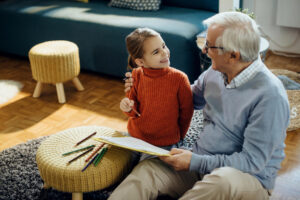Family relationship
Discover Down Syndrome: Understanding, Characteristics, and Early Intervention
Down Syndrome, known as Trisomy 21, represents a significant aspect of human diversity, reminding us of the intrinsic value and potential within each individual, regardless of genetic differences. This condition, resulting from an extra copy of chromosome 21, is the most commonly diagnosed chromosomal condition in the United States, affecting approximately 1 in every 700…
Read MoreEmbracing Neurodiversity: Ways to Connect Meaningfully
Embracing neurodiversity is a key step toward true inclusivity in a world that values diversity. Neurodiversity encompasses variations in the human brain that affect sociability, learning, attention, mood, and more, and includes conditions such as autism, ADHD, and dyslexia. Connecting with neurodiverse individuals can be both enriching and enlightening, requiring sensitivity, patience, and a genuine willingness to understand unique perspectives. Strategies to foster these connections include educating oneself about neurodiversity, practicing active listening, creating a safe and accepting environment, adapting communication styles, focusing on interests and strengths, being patient and flexible, advocating for inclusivity, and embracing the learning process. These approaches help build meaningful relationships with neurodiverse individuals, offering fresh insights and deepening our collective understanding of the human experience. Ultimately, by engaging with empathy, openness, and a readiness to learn, we contribute to a more inclusive and supportive society, celebrating the beauty and strength found in our diversity.
Read MoreStrengthening Bonds with Grandma: Navigating Dementia with Love and Patience
Caring for a loved one with dementia presents both challenges and opportunities for deeper connections. As Grandma embarks on this journey, your support and understanding are invaluable. Here are practical tips to strengthen your bond, ensuring moments together are filled with love, patience, and joy:
Listen attentively to Grandma, validating her experiences without judgment.
Enter her reality, minimizing stress by engaging in her version of events.
Create a memory box or album to spark conversations and honor her life story.
Simplify activities, choosing ones that bring a sense of accomplishment.
Use music and art to trigger memories and emotions, fostering connection.
Stay patient and flexible, adapting to her mood and abilities each day.
Educate yourself about dementia to anticipate needs and improve communication.
Celebrate small victories, boosting Grandma’s self-esteem and reinforcing your bond.
Take care of yourself, seeking support to maintain your own well-being.
Foster a loving environment, providing comfort and security through physical affection.
Though dementia alters the way we connect, it doesn’t diminish the depth of our relationships. By embracing patience, creativity, and empathy, we can create meaningful moments that transcend its challenges. Celebrate and cherish who Grandma is now, strengthening your bond with each gesture of love and understanding.



